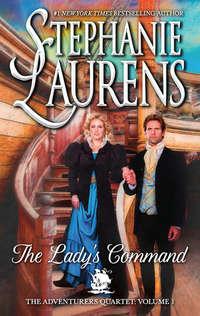
Полная версия
The Pursuits Of Lord Kit Cavanaugh
Kit was inwardly shaking his head as, with Wayland beside him, he stepped onto the pavement outside the Dock Company building.
For his part, Wayland was actually shaking his head.
Kit halted and eyed his friend. “What?”
Wayland shrugged. “Nervy lot.” He looked around. “I think the nearest hardware store is that way.” He pointed down the quay.
Sliding his hands into his pockets, Kit fell in beside Wayland as he led the way.
* * *
When, an hour later, Kit and Wayland rounded the end of Princes Street and walked onto the stretch of waterfront known as the Grove, it was to see Finch and Hemmings waiting farther along, outside the door of the third warehouse from the corner.
Evening had fallen and was edging toward night, and the slap of wavelets against the pilings was increasingly audible as other workaday noises faded. The row of warehouses fronted directly onto the Grove, with a narrow, cobbled lane separating their façades from the rough grass beneath the line of trees that gave the area its name. Beyond the trees, lamps were spaced along the river’s edge, but the warehouses lay far enough back that only faint light reached their doors.
Wayland huffed. “Just as well we got these lanterns.”
They’d bought four hurricane lanterns, reasoning that they would surely need them as the days grew shorter.
As they approached the warehouse, Kit nodded in greeting. “Hemmings. Finch.”
Hemmings smiled and half bowed.
“My lord. Mr. Cobworth.” Having already unlocked the padlock that secured the doors, Finch lifted the latch and drew one of the double doors back.
Kit caught the edge of the second door and hauled it wide.
Wayland walked inside, then halted and, through the dimness, looked around. After several seconds, he bent and set down the two lanterns he’d carried and crouched to light them.
Kit stopped a pace away. He put the two lanterns he’d carried beside Wayland’s two. When light flared and Wayland replaced the glass surround on the first lantern, then turned to light the next, Kit picked up the first lantern, raised it, and played the beam around the gloomy space.
Although his hands remained busy lighting the lanterns, Wayland looked up, too. After a moment, he said, “The floor’s good—nice and even and the planks are well-laid and the surface smooth. As for layout...offices to the right, along the side wall. Receptionist and foreman in one closer to the door, then the rest of that space is mine.”
By which Wayland meant that his design studio would take up the space behind the front office. Kit grunted in agreement; as Wayland gave his attention to the lanterns, Kit turned and swept the lantern’s beam over the other side of the warehouse.
The doors were off center, closer to the right, leaving the bulk of the warehouse to the left. The space was surprisingly uncluttered; there was no detritus—no ropes, broken struts, hessian, or any of the usual accumulated rubbish one tended to find in the corners of such buildings.
Wayland rose, a lantern in his hand; standing beside Kit, he directed the lantern upward, splashing light across the beams overhead. After a moment of studying them, Wayland murmured, “Good call choosing this place. Those are solid.” With the lantern, he traced one of the three main beams across to the wall, playing light over the upright support there, then he turned and examined the support on the other side. Then he flashed Kit a grin. “We’ll be able to set our pulleys up there and lift our hulls with no problem at all.”
“Excellent.” Kit peered deeper into the shadows to the left and spotted a row of raised desks lined up along the side wall. They looked like a conglomeration of clerk’s desks and draftsman’s desks with sloping tops. A goodly number of tall stools stood clustered at one end of the line.
“Presumably from the charity,” Wayland said. “The desks look to be in too-good condition to be discards.”
Surveying the desks, Kit murmured, “It must be some sort of charity for the indigent. I assume they’ll take them away.” Kit turned back to survey the area they’d elected to make into offices. “Where do you want to start measuring?”
Wayland waved. “Let’s start by the door.”
Wayland always carried an extendible metal measuring rod, along with notebook, pencil, and chalk. Between them, they marked and measured the dimensions of the offices, with Wayland noting everything down so he could draw up a plan and work out what timbers were required for the construction.
Once they’d finished measuring the offices, ignoring the pair at the door, who shifted restlessly as darkness encroached and a chill rose off the river, Kit helped Wayland make a series of measurements relating to the pulley gantry Wayland had in mind to allow them to work on multiple hulls at the same time with only one overhead hoist.
Finally, still busily jotting in his notebook, Wayland declared, “That’s all I need for now. I’ll draw up the plans and check in with you tomorrow. Once you sign off, I’ll get the timbers ordered. We’ll also need steel for the gantry.” He paused to glance around the shadowy space. “Depending on the caliber of the men we hire, it’ll take a few days to construct the offices and the gantry. By then, I’ll have the hull design ready, and we can move the men on to the frame for that.”
He met Kit’s eyes. “That’ll be a good start.”
Kit nodded. “An excellent start, even if we do have to wait until Monday to commence.”
Looking around one last time, Wayland muttered, “We’ll have to see what level of carpenters we can find.”
Kit waved toward the door; Hemmings and Finch were still waiting there. As he and Wayland crossed toward them, Kit called, “Thank you for arranging this, gentlemen.”
“Our pleasure, your lordship.” Rubbing his hands together, Hemmings stepped back as Kit and Wayland, having collected and doused the lanterns, emerged from the warehouse. “I take it all is satisfactory?”
“Entirely,” Kit returned with a reassuring smile.
Wayland handed his lanterns to Kit and helped Finch close the warehouse doors.
Kit watched Finch secure the latch with the padlock. Recalling the desks they’d seen and with Wayland’s words rolling around in his head, when Finch turned, Kit caught his eye. “Might some of the men attending the charity”—Kit tipped his head toward the warehouse—“be suitable for employment in our yacht-building enterprise?”
Finch blinked, then cut another of those weighted glances at Hemmings. After a second, Finch returned his gaze to Kit and shook his head. “That’s highly unlikely, my lord. But there’s an excellent labor exchange just around the corner on the quay.” Finch pointed in that direction. “For carpenters and the like, that’s where I’d ask—it’s the most likely place to find workmen of the sort I believe you’ll need.”
Keeping his expression relaxed and uninformative, Kit studied Finch for a heartbeat; something about the charity made Finch and Hemmings nervous, but Kit couldn’t imagine what it might be. “Thank you.” Kit inclined his head to Finch. “Either myself or Mr. Cobworth will call there tomorrow.”
He and Wayland parted from the two Dock Company men with handshakes, renewed thanks, and cordiality all around, then, on Hemmings’s recommendation, Kit and Wayland headed for the Dragon’s Head public house for dinner.
* * *
Sylvia Buckleberry sat at the small desk in her cramped office in the shadow of Christ Church and, head bent, carefully tallied her ledgers, penny by penny accounting for the expenditures of the previous month.
Outside the small window at her back, the morning was fine, the sky a soft autumnal blue with a gentle breeze skating fluffy white clouds across the heavens. The cooing of the doves that nested around the church tower provided a pleasant background drone, punctuated by the skittering of ravens on nearby roofs.
Sylvia did her best to blot out the distractions of the pleasant day. Arithmetic had never been her strong suit, but given she was spending the parish’s funds, she made sure the bills added up to the last halfpenny.
She’d almost reached the end of the last column when a sharp rap fell on her closed door. Suppressing a most unladylike hiss, she grabbed a scrap of paper and scribbled a note of her total, then set aside her pencil and, closing the ledger, looked up and called, “Come in.”
The door opened, and three gentlemen filed in—or tried to; they had to leave the door open to have room enough to stand.
Sylvia’s heart sank as she recognized her callers. It had been over two years since she’d last seen the three together; all were figures in the local community and served on the Bristol Dock Company’s board—Mr. Forsythe, the mayor, Mr. Hoskins, one of the aldermen, and, lastly, Mr. Finch, secretary to the board.
Oh, no. The sight of Finch, in particular, did not bode well.
She forced a bright smile to her lips and adopted an expression she hoped appeared guileless. “Mr. Forsythe, Mr. Hoskins, and Mr. Finch.” She inclined her head to each. “Good morning, gentlemen. To what do I owe this pleasure?”
The three exchanged glances, then the mayor shuffled forward to take the single small chair that sat before the desk. The chair creaked faintly as his weight settled upon it, then he leaned forward and earnestly said, “My dear Miss Buckleberry, I’m sure you recall the terms of our agreement regarding your school using the premises on the Grove.”
Sylvia recalled the stipulations attached to the use of the old warehouse very well. However, she simply stared blankly at the mayor while her mind scrambled...
Surely not. The dockyards were in decline. Who on earth would want the old warehouse?
When the mayor seemed as disinclined to speak as she, she ventured, “I’m not sure I understand...” Always better to have them think her a dim-witted female; she was more likely to gain concessions that way.
Mr. Hoskins cleared his throat, then offered, “Our allowing the school to use the warehouse was, if you recall, on the condition that no business required the space—that is, no business that would pay to lease the place and create jobs for the local men.”
Sylvia had transferred her gaze to Hoskins; his words sent a chill lancing through her.
Finch shifted impatiently. “The truth, Miss Buckleberry, is that a new business has taken a lease on the warehouse, commencing from the beginning of next week. The school will need to vacate the premises by week’s end.”
Trust Finch to put it bluntly; his words were the blow Sylvia had suspected was coming the instant she’d seen his face. He’d always been a reluctant supporter, but whether it was her he didn’t approve of or the notion behind the school, she’d never determined.
“As we’re all well aware,” the mayor hurried to say, “the city is facing some difficulty regarding ongoing work for our many ship workers and dockworkers. It’s not a crisis, per se, but...well, we can’t afford to turn any such business away.”
Sylvia blinked. “Surely there are other warehouses?”
“Not of the sort this company needs. Not on our docks,” Mr. Hoskins informed her. “And while we realize this must come as an unwelcome surprise, we’re sure you’ll agree that it’s critically important to accommodate the sort of businesses who can hire the men otherwise unemployed—men like the parents of your pupils.”
“Sad though I am to say it, Miss Buckleberry,” the mayor went on, “jobs for the fathers must take precedence over teaching the sons.”
Sylvia knew the situation in the city, especially on the docks. In the circumstances, she couldn’t argue.
“Besides,” Finch said, “as I understand it, the end purpose of teaching the boys is to enable them to get jobs, but if there are no jobs, then what is the point of schools such as yours?”
It was on the tip of her tongue to retort that the school wasn’t “hers,” yet it didn’t really matter; Finch was correct.
Reluctantly, she inclined her head, accepting if not exactly agreeing. She focused on the mayor. “You say we must be out of the warehouse by Friday. I’m left facing the question of where the school is to go.” She arched her brows and, with her gaze, included all three men. “Do you have any suggestions, gentlemen?”
Even Finch had the grace to look sheepish—or at least as sheepish as he could.
“Sadly, I don’t.” The mayor shifted on the chair, eliciting a protesting creak.
“If I hear of any possible location,” Mr. Hoskins said, “I will immediately let you know.”
“There is no other suitable property on the company’s books,” Finch stated.
The mayor hauled out his fob watch and looked at it. “Good gracious! Is that the time?” Tucking the watch back into his waistcoat pocket, he rose and essayed a commiserating smile. “The Dock Company regrets the impact on the school, my dear, but we cannot be other than pleased to welcome a new business to our docks.”
She was forced to murmur appropriate phrases as the men took their leave.
As the door closed behind them, she slumped back in her chair.
Of all the potential disasters...
After two years at the warehouse and given the draining of work from the docks, she’d assumed the school’s use of the premises was secure.
What am I going to do?
The sounds of a busy morning reached her through the thin glass at her back; horses crisply clopping down the streets, the sound of hurrying footsteps on the pavements, the occasional hailing of a hackney—people rushing about their business. Yet inside her office, her brain seemed to have slowed.
Finch hadn’t been entirely in error—the school was effectively hers. Her dream, her creation—her purpose in life.
After having shared a London Season with her distant cousin and close friend, Felicia Throgmorton, during which neither of them had taken, Sylvia and Felicia both had seen enough of ton life to be quite certain that their futures lay outside that gilded circle.
For Felicia, her “what else?” had been obvious; she’d had an inventor father and inventor brother to keep house for, to corral, steer, and anchor. Admittedly, Felicia had recently married—to a member of the nobility, no less—but she’d met Randolph Cavanaugh at her home, and as Sylvia understood it, neither had any great ambition to waltz in the ton; their interests lay elsewhere, namely in inventions and investing, and Sylvia had to admit that a life at Rand’s side would suit Felicia to the ground.
Sylvia, however, hadn’t been needed at home. Her widowed father, Reverend Buckleberry, held a comfortable living at Saltford, between Bristol and Bath, and had a highly efficient housekeeper to keep him in line and see to all his needs. Her father was a hearty, active soul, deeply engaged with his parish; he hadn’t needed Sylvia to stand by his side.
After returning from London, Sylvia had spent a wasted year at the vicarage, trying to find a purpose to devote herself to. No gentleman had ever tempted her to consider marriage, and somewhere along the way, she’d set aside all dreams of a home and family of her own. She felt perfectly certain that particular option was never going to come her way.
But with marriage off her table, she’d needed some other occupation—something to which to devote her mind, heart, and considerable organizational talents. But with no formal training in anything beyond the usual subjects deemed suitable for young ladies and no fervent obsession to guide her, she’d all but despaired of finding any project with which to occupy her days.
She’d been close to falling into a dejected funk when her father’s close friend the Bishop of Bath and Wells had called at Saltford to spend a few days discussing parish matters with her father, and she’d overheard the bishop bewailing the fact that, despite pressure from the upper levels of both church and state, in Bristol, as yet no progress had been made on establishing a school for the underclass—specifically, for boys whose fathers worked on the docks and in the associated shipyards.
That had been her call to arms—her epiphany when a light had shone from above and illuminated the right path forward.
With the bishop’s and her father’s support, she’d enlisted the aid of the Dean of Christ Church in Bristol—another of her father’s old friends—and, by sheer force of will and personality, had convinced the Christ Church Parish Council to back the establishment of such a school. The parish had agreed to fund the salary for two teachers and an assistant as well as paying for all sundry items such as books, chalks, and slates.
But the council’s one stipulation had been that they couldn’t afford to pay the rent for premises; they had made their offer of funds conditional on a suitable venue being donated free of charge.
Sylvia suspected the elders on the council had thought that stipulation would prove an insurmountable hurdle, but having noticed the empty warehouse facing the Grove and understanding that dockside business was ebbing from the city, she’d petitioned the Dock Company board to grant the school the right to use the warehouse free of charge.
Of course, first, she’d made a point of meeting each of the wives of the gentlemen on the board—at morning teas, at the city library, and at the salon of the city’s most-favored modiste. By dint of casting the school as a socially desirable charity—one the city should support in order to bolster its credentials as a civilized place—she’d enlisted the support of sufficient ladies so that when she’d gone before the board and made her case, she’d been fairly certain of success.
But now that she—the school—had lost the use of the warehouse, and the Dock Company didn’t have another building the school might use...
Without premises donated by some similar entity, the school would not survive.
The thought of the school closing curdled her stomach. She might have started the school as a way to occupy herself, but it had become the obsession she hadn’t previously had. Bad enough that she couldn’t imagine how she would fill her days without it, but now there was far more at stake than that; under her guidance, the teachers and pupils—all seventeen currently attending—had grown into a remarkably engaged group. The pupils attended because they wanted to—because they’d developed a thirst for knowledge and had taken to heart her oft-repeated litany that education was the pathway to their future.
The pupils were committed, the teachers even more so. University-trained, both were devoted educators, as was their less-qualified but equally dedicated assistant.
Sylvia had worked for two and more years to get the school to where it was, and it now delivered something vital for the pupils, the teachers, and, indeed, the city itself—just as she’d told the board members’ wives all those months ago.
She’d succeeded, and all had been running so smoothly...
She stared at the door, then set her chin. “I am not going to allow the school to close.”
That was the first decision—the one from which all else would stem.
“I need to find new premises that someone will donate—I did that once, and I can do it again.” It would be up to her to pull the school’s irons out of the fire. Although the school operated under the aegis of the Dean, from the start, their understanding had been that the school was hers to manage. It was her challenge; there was no one else to act as the school’s champion. That was her role—the role she’d fought for.
“Just as I’m going to fight through this.” Lips thinning, eyes narrowing, she considered her options. Staring at the door, she muttered, “So...what can I do?”
CHAPTER 2
There was one thing Sylvia wasn’t prepared to do, and that was give up. The following morning, she strode briskly along King Street, her goal the Dock Company offices on Broad Quay.
The previous day, after the Dock Company directors had dropped their bombshell and shattered her peace of mind, she’d gathered herself and her thoughts and had sought an urgent meeting with the Dean, he under whose auspices her school for dockyard boys had been created. Although the Dean had been, as ever, sympathetic and supportive, he hadn’t had any suggestions to make as to who she might approach to secure new premises for the school.
That meeting had been followed hours later by another with the parish council, the previous evening being the night of the council’s regular weekly conference. The outcome had been less than satisfactory—indeed, close to horrifying—which had only hardened her resolve.
Depressingly, between informing the Dean and, later, the parish council of the unexpected change in the school’s circumstances, she’d felt compelled to visit the school and inform the staff and students that, due to unforeseen events, it was possible that the school might have to close for a week or so after the end of the week. Unsurprisingly, her announcement had caused dismay and consternation, but better they heard it from her than via the dockside rumor mill. She’d done her best to allay everyone’s concerns, reassuring them all that if it came to a closure, it would only last until new premises were secured, yet the expressions haunting so many of the students—the anxiety etched on their young faces—had clutched at her heart.
They weren’t her children, and she didn’t think of them as such, but she knew each and every one now, knew their stories, their families, and, in most cases, their hopes and dreams, and felt an almost-parental responsibility for each boy.
Most had had to fight and win battles of their own to be allowed to attend regularly rather than find whatever work they could; each of the seventeen regular pupils had had to gain the support of their family, and given the current lack of prosperity on the Bristol docks, that had been a feat in itself.
She was determined not to let them—and the teachers and assistant—down. She would find a place—would find someone willing to donate either a venue or the rent for one.
She had to—and quickly—or the parish council would redirect the school’s funds to some other worthy cause.
While none of the council members had had any advice to offer regarding where she might find new premises for the school, they had made it clear, albeit gently, that as the council could not afford to rent such premises itself, if appropriate donated space was not forthcoming, the council would have to withdraw all funding. As the chairman had explained, there simply wasn’t sufficient money in the parish coffers to support a nonfunctioning school; in the current climate, the parish had too many other calls on its funds.
She’d left that meeting with a hideous sinking feeling in the pit of her stomach. But after a night of tossing and turning and, in between bouts of sleep, evaluating increasingly fanciful options, she’d woken with a start—and a rather bold, certainly desperate, but possible way forward clear in her mind.
Hence her impending visit to the Dock Company offices.
On reaching the end of King Street, she turned right into Broad Quay. The Dock Company offices faced the Frome and were quite grand, with a semicircular set of steps leading up to a pair of glossy, green-painted doors with glass panels bearing the company’s name and logo inset into each. Sylvia pushed on the brass handle and walked briskly into the tiled foyer. Having been to the building before, she didn’t pause but continued to the stairs at the end of the foyer and went up to the first floor.
There, she rapped peremptorily on the door facing the stairs. On hearing a somewhat testy “Come,” she opened the door and walked inside.
She fixed the black-suited figure behind the desk with an uncompromising gaze. “Good morning, Mr. Finch.”
Finch didn’t look pleased but, nevertheless, got to his feet, returning her greeting with a curt nod. “Miss Buckleberry. I do hope you aren’t here to tell me that there will be any difficulty over the school vacating the warehouse.”
Sylvia allowed her gaze to rest heavily on Finch until he grew restless and started fingering the buttons on his coat. Then she simply said, “No. I’m here to inquire as to the name of the new tenant and where I may find him.”











